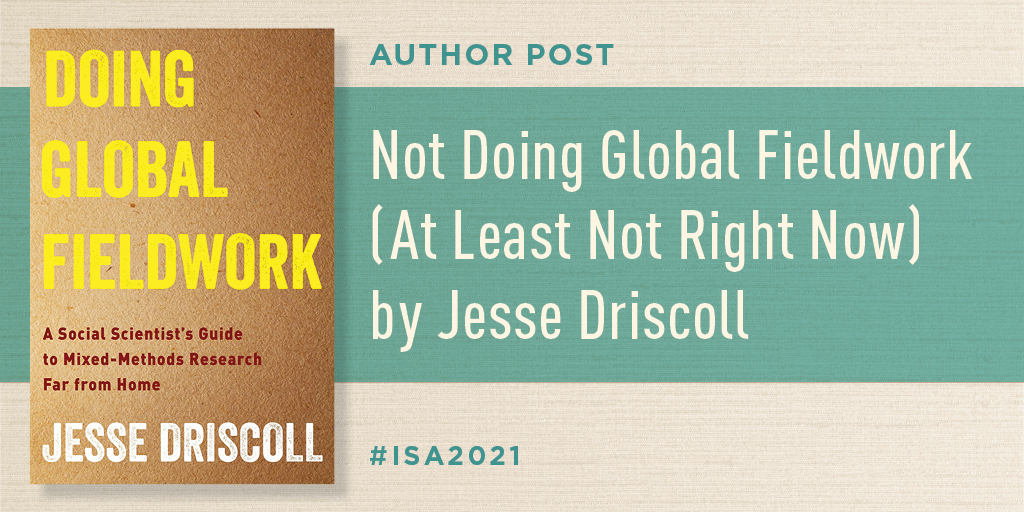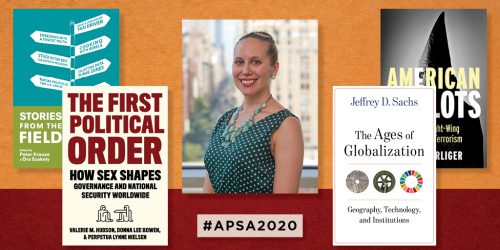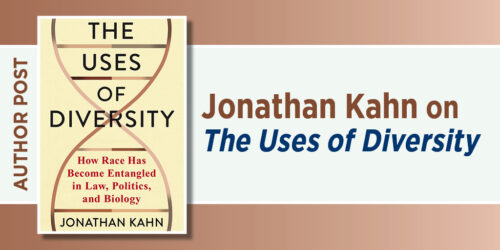Not Doing Global Fieldwork (At Least Not Right Now)
By Jesse Driscoll

Many graduate students imagine their comparative advantage will be original data collection. Fieldwork, in this idealized conception, provides an opportunity to (try to) break free of the rigid, sometimes cruel, hierarchical status structures imposed by the ivory tower in a proving ground where different virtues and abilities shine: empathy, people skills, and authencity, as well as the desire to interact with subjects, to improvise, to spot answerable questions, to measure things in creative ways, to gain real-life experience, and to explore.
They had plans to start a year ago. Then COVID broke out and, with it, the impossibility of travel, the collapse of the job market, and an intensification of competition for already scarce resources. For many, this has led to a reassessment of risks.
If this sounds familiar to you, my most important piece of advice is this: don’t rush out. Despite intense pressure, try to pause, step back, and engage in social science purposively.
For many, this has led to a reassessment of risks.
Think about your subjects. Think about how different their lives probably are compared to 7–8 years ago, when the data for today’s trending papers were collected. Think about the ripple effects of COVID that are likely to follow vulnerable study communities for years. We have all been in crisis management mode (we still are). We still have not fully processed the scale of the dislocations or losses, or the question of where our responsibility for assistance begins or ends. We are not used to thinking of ourselves as super-spreaders or of our research as a potential human rights violation. Our community must manage this risky “return to research” phase with care. If you are tagged as having engaged in thoughtless behavior that endangers your subjects, it is not clear how to get un-tagged. The discipline has a long memory, with little patience for reckless careerists. You only have one reputation.
We are not used to thinking of ourselves as super-spreaders or of our research as a potential human rights violation.
Think about the classic books you wanted to emulate when you decided to come to graduate school. To remind yourself of how you got to be here, reread one. You may have been eager to get to the part of the job with travel and exotic passport stamps. Instead, you have time. Find a corner of the library that you might want to curate, much like a palace gardener for life. This is the life of the mind: unstructured time to read. Otium cum dignitate (leisure with dignity). Remember, we enjoy labor protections as a readers guild, not as a fieldworkers guild.
Think about carefully curating your social media intake to avoid being overwhelmed or exposing yourself to feeds that discourage you. The race is long.
Think about taking a class or two that you would otherwise not have made time for. Some skills are easier to acquire in a classroom, and you’ll be around next fall— so why not? Even if you do not think math is your comparative advantage, a little ability to merge datasets or make maps in ARC-GIS can go a long way.
Hybrid intellectual communities are more accessible than ever since we’ve all decamped from brick-and-mortar to the internet.
Think about taking a little more time with your language acquisition. Zoom has made it easier than ever to connect with local conversation partners. Or think about taking a history or historiography class to engage with your site. Professional historians tend to believe that everyone else playing with history does so as an amateur, and the perception that political scientists use fancy math to play fast and loose with facts comes from somewhere, so consider having a historian mentor you.
More broadly, think about the ideal composition of your committee. Dissertation committees are “reader coalitions.” Consider getting outside feedback on your writing and ideas. Depending on your tastes, you may want to be credentialed by other scholars outside your subfield silo, making common cause with historians, anthropologists, data scientists, or sociologists. All of these communities think about data collection differently, but all of them value careful measurement and have different sets of findings they are confident in. Hybrid intellectual communities are more accessible than ever since we’ve all decamped from brick-and-mortar to the internet. You can find workshops and discussions online with a little networking.
Think about treating digital exploration of puzzles as collaborative, not adversarial.
Think about writing as many chapters from your desktop as you can. With every passing year, the amount of information at one’s fingertips grows exponentially. Your methods classes probably gave you many new computer-enabled tools. Before the muscles have a chance to atrophy, put them to work. If you are not sure how to get started, consider giving construct validity a chapter-length treatment. This will make it clear to you that most of what is destined to fill your dissertation does not require travel: It requires a library card and the discipline to read, to process difficult ideas and re-state them in your own words, to stand on the shoulders of giants, to track attribution with careful footnotes and page numbers, and all the rest. This is the hard work of our craft. Don’t delay! Start to play with others’ data. Become puzzled, then frame future fieldwork grant proposals (someday) as follow-up studies.
Think about treating digital exploration of puzzles as collaborative, not adversarial. Most of us who go to the field come back with data we never get around to publishing. A collegial email from an .edu address might be an opportunity to get your hands dirty cleaning a dataset, running some code, testing some hypotheses, and making new friends.
Which conversation do you want to be a part of?
Think positively. Think about what kind of ideal political community you want to assist as you describe post–COVID recovery. Some journals will fill with articles written from home offices, debating which state responses to the epidemic were plausibly exogenous. Other scholars will hone survey techniques and try to develop valid cross-country/cross-cultural measures to “back out” exposure to virus-caused dislocations. Some will compare policy responses to reveal normally hidden features of state capacity. Others will compare the experiences of different families and communities as they deal with loss, trauma, pixelization, and loss of autonomy. Which conversation do you want to be a part of? We have the instinct to say, “All of them are important!” But there is only so much time. What is your comparative advantage, really?
Think about it.
Jesse Driscoll is associate professor of political science at the School of Global Policy and Strategy at the University of California, San Diego. You can save 20 percent on his new book Doing Global Fieldwork: A Social Scientist’s Guide to Mixed-Methods Research Far from Home, or on any of our featured ISA titles when you use coupon code ISA at checkout now through June 1, 2021.







